- Home
- Emile Gaboriau
L'affaire Lerouge. English Page 3
L'affaire Lerouge. English Read online
Page 3
CHAPTER III.
M. Tabaret's house was in fact not more than four minutes' walk from therailway terminus of St. Lazare. It was a fine building carefully kept,and which probably yielded a fine income though the rents were not toohigh. The old fellow found plenty of room in it. He occupied on thefirst floor, overlooking the street, some handsome apartments, wellarranged and comfortably furnished, the principal of which was hiscollection of books. He lived very simply from taste, as well as habit,waited on by an old servant, to whom on great occasions the conciergelent a helping hand.
No one in the house had the slightest suspicion of the avocations of theproprietor. Besides, even the humblest agent of police would be expectedto possess a degree of acuteness for which no one gave M. Tabaretcredit. Indeed, they mistook for incipient idiocy his continualabstraction of mind.
It is true that all who knew him remarked the singularity of hishabits. His frequent absences from home had given to his proceedings anappearance at once eccentric and mysterious. Never was young libertinemore irregular in his habits than this old man. He came or failed tocome home to his meals, ate it mattered not what or when. He went outat every hour of the day and night, often slept abroad, and evendisappeared for entire weeks at a time. Then too he received thestrangest visitors, odd looking men of suspicious appearance, andfellows of ill-favoured and sinister aspect.
This irregular way of living had robbed the old fellow of muchconsideration. Many believed they saw in him a shameless libertine, whosquandered his income in disreputable places. They would remark to oneanother, "Is it not disgraceful, a man of his age?"
He was aware of all this tittle-tattle, and laughed at it. This did not,however, prevent many of his tenants from seeking his society and payingcourt to him. They would invite him to dinner, but he almost invariablyrefused.
He seldom visited but one person of the house, but with that one hewas very intimate, so much so indeed, that he was more often in herapartment, than in his own. She was a widow lady, who for fifteen yearshad occupied an apartment on the third floor. Her name was Madame Gerdy,and she lived with her son Noel, whom she adored.
Noel Gerdy was a man thirty-three years of age, but looking older; talland well made, with a noble and intelligent face, large black eyes, andblack hair which curled naturally. An advocate, he passed for havinggreat talent, and greater industry, and had already gained a certainamount of notoriety. He was an obstinate worker, cold and meditative,though devoted to his profession, and affected, with some ostentation,perhaps, a great rigidity of principle, and austerity of manners.
In Madame Gerdy's apartment, old Tabaret felt himself quite at home. Heconsidered her as a relation, and looked upon Noel as a son. In spiteof her fifty years, he had often thought of asking the hand of thischarming widow, and was restrained less by the fear of a refusal thanits consequence. To propose and to be rejected would sever the existingrelations, so pleasurable to him. However, he had by his will, whichwas deposited with his notary constituted this young advocate his solelegatee; with the single condition of founding an annual prize of twothousand francs to be bestowed on the police agent who during the yearhad unravelled the most obscure and mysterious crime.
Short as was the distance to his house, old Tabaret was a good quarterof an hour in reaching it. On leaving M. Daburon his thoughts revertedto the scene of the murder; and, so blinded was the old fellow toexternal objects, that he moved along the street, first jostled on theright, then on the left, by the busy passers by, advancing one step andreceding two. He repeated to himself for the fiftieth time the wordsuttered by Widow Lerouge, as reported by the milk-woman. "If I wishedfor any more, I could have it."
"All is in that," murmured he. "Widow Lerouge possessed some importantsecret, which persons rich and powerful had the strongest motives forconcealing. She had them in her power, and that was her fortune. Shemade them sing to her tune; she probably went too far, and so theysuppressed her. But of what nature was this secret, and how did shebecome possessed of it? Most likely she was in her youth a servant insome great family; and whilst there, she saw, heard, or discovered,something--What? Evidently there is a woman at the bottom of it. Did sheassist her mistress in some love intrigue? What more probable? And inthat case the affair becomes even more complicated. Not only must thewoman be found but her lover also; for it is the lover who has moved inthis affair. He is, or I am greatly deceived, a man of noble birth. Aperson of inferior rank would have simply hired an assassin. This manhas not hung back; he himself has struck the blow and by that meansavoiding the indiscretion or the stupidity of an accomplice. He is acourageous rascal, full of audacity and coolness, for the crime hasbeen admirably executed. The fellow left nothing behind of a nature tocompromise him seriously. But for me, Gevrol, believing in the robbery,would have seen nothing. Fortunately, however, I was there. But yet itcan hardly be that," continued the old man. "It must be something worsethan a mere love affair."
Old Tabaret entered the porch of the house. The concierge seated by thewindow of his lodge saw him as he passed beneath the gas lamp.
"Ah," said he, "the proprietor has returned at last."
"So he has," replied his wife, "but it looks as though his princesswould have nothing to do with him to-night. He seems more loose thanever."
"Is it not positively indecent," said the concierge, "and isn't he ina state! His fair ones do treat him well! One of these fine mornings Ishall have to take him to a lunatic asylum in a straight waistcoat."
"Look at him now!" interrupted his wife, "just look at him now, in themiddle of the courtyard!"
The old fellow had stopped at the extremity of the porch. He had takenoff his hat, and, while talking to himself, gesticulated violently.
"No," said he, "I have not yet got hold of the clue, I am getting nearit; but have not yet found it out."
He mounted the staircase, and rang his bell, forgetting that he had hislatch-key in his pocket. His housekeeper opened the door.
"What, is it you, sir," said she, "and at this hour!"
"What's that you say?" asked the old fellow.
"I say," replied the housekeeper, "that it is more than half-past eighto'clock. I thought you were not coming back this evening. Have you atleast dined?"
"No, not yet."
"Well, fortunately I have kept your dinner warm. You can sit down to itat once."
Old Tabaret took his place at the table, and helped himself to soup,but mounting his hobby-horse again, he forgot to eat, and remained, hisspoon in the air, as though suddenly struck by an idea.
"He is certainly touched in the head," thought Manette, the housekeeper."Look at that stupid expression. Who in his senses would lead the lifehe does?" She touched him on the shoulder, and bawled in his ear, as ifhe were deaf,--"You do not eat. Are you not hungry?"
"Yes, yes," muttered he, trying mechanically to escape the voice thatsounded in his ears, "I am very hungry, for since the morning I havebeen obliged--" He interrupted himself, remaining with his mouth open,his eyes fixed on vacancy.
"You were obliged--?" repeated Manette.
"Thunder!" cried he, raising his clenched fists towards theceiling,--"heaven's thunder! I have it!"
His movement was so violent and sudden that the housekeeper was a littlealarmed, and retired to the further end of the dining-room, near thedoor.
"Yes," continued he, "it is certain there is a child!"
Manette approached him quickly. "A child?" she asked in astonishment.
"What next!" cried he in a furious tone. "What are you doing there? Hasyour hardihood come to this that you pick up the words which escape me?Do me the pleasure to retire to your kitchen, and stay there until Icall you."
"He is going crazy!" thought Manette, as she disappeared very quickly.
Old Tabaret resumed his seat. He hastily swallowed his soup which wascompletely cold. "Why," said he to himself, "did I not think of itbefore? Poor humanity! I am growing old, and my brain is worn out. Forit is clear as day; the circu
mstances all point to that conclusion."
He rang the bell placed on the table beside him; the servant reappeared.
"Bring the roast," he said, "and leave me to myself."
"Yes," continued he furiously carving a leg of Presale mutton--"Yes,there is a child, and here is his history! The Widow Lerouge, when ayoung woman, is in the service of a great lady, immensely rich. Herhusband, a sailor, probably had departed on a long voyage. The lady hada lover--found herself enciente. She confided in the Widow Lerouge, and,with her assistance, accomplished a clandestine accouchement."
He called again.
"Manette, the dessert, and get out!"
Certainly such a master was unworthy of so excellent a cook as Manette.He would have been puzzled to say what he had eaten for diner, or evenwhat he was eating at this moment; it was a preserve of pears.
"But what," murmured he, "has become of the child? Has it beendestroyed? No; for the Widow Lerouge, an accomplice in an infanticide,would be no longer formidable. The child has been preserved, andconfided to the care of our widow, by whom it has been reared. They havebeen able to take the infant away from her, but not the proofs of itsbirth and its existence. Here is the opening. The father is the man ofthe fine carriage; the mother is the lady who came with the handsomeyoung man. Ha! ha! I can well believe the dear old dame wanted fornothing. She had a secret worth a farm in Brie. But the old lady wasextravagant; her expenses and her demands have increased year by year.Poor humanity! She has leaned upon the staff too heavily, and broken it.She has threatened. They have been frightened, and said, 'Let there bean end of this!' But who has charged himself with the commission? Thepapa? No; he is too old. By jupiter! The son,--the child himself! Hewould save his mother, the brave boy! He has slain the witness and burntthe proofs!"
Manette all this time, her ear to the keyhole, listened with all hersoul; from time to time she gleaned a word, an oath, the noise of a blowupon the table; but that was all.
"For certain," thought she, "his women are running in his head."
Her curiosity overcame her prudence. Hearing no more, she ventured toopen the door a little way. The old fellow caught her in the very act.
"Monsieur wants his coffee?" stammered she timidly.
"Yes, you may bring it to me," he answered.
He attempted to swallow his coffee at a gulp, but scalded himself soseverely that the pain brought him suddenly from speculation to reality.
"Thunder!" growled he; "but it is hot! Devil take the case! it has setme beside myself. They are right when they say I am too enthusiastic.But who amongst the whole lot of them could have, by the sole exerciseof observation and reason, established the whole history of theassassination? Certainly not Gevrol, poor man! Won't he feel vexed andhumiliated, being altogether out of it. Shall I seek M. Daburon? No,not yet. The night is necessary to me to sift to the bottom all theparticulars, and arrange my ideas systematically. But, on the otherhand, if I sit here all alone, this confounded case will keep me in afever of speculation, and as I have just eaten a great deal, I may getan attack of indigestion. My faith! I will call upon Madame Gerdy: shehas been ailing for some days past. I will have a chat with Noel, andthat will change the course of my ideas."
He got up from the table, put on his overcoat, and took his hat andcane.
"Are you going out, sir?" asked Manette.
"Yes."
"Shall you be late?"
"Possibly."
"But you will return to-night?"
"I do not know."
One minute later, M. Tabaret was ringing his friend's bell.
Madame Gerdy lived in respectable style. She possessed sufficient forher wants; and her son's practice, already large, had made them almostrich. She lived very quietly, and with the exception of one or twofriends, whom Noel occasionally invited to dinner, received very fewvisitors. During more than fifteen years that M. Tabaret came familiarlyto the apartments, he had only met the cure of the parish, one of Noel'sold professors, and Madame Gerdy's brother, a retired colonel. Whenthese three visitors happened to call on the same evening, an eventsomewhat rare, they played at a round game called Boston; on otherevenings piquet or all-fours was the rule. Noel, however, seldomremained in the drawing-room, but shut himself up after dinner inhis study, which with his bedroom formed a separate apartment to hismother's, and immersed himself in his law papers. He was supposed towork far into the night. Often in winter his lamp was not extinguishedbefore dawn.
Mother and son absolutely lived for one another, as all who knew themtook pleasure in repeating. They loved and honoured Noel for the carehe bestowed upon his mother, for his more than filial devotion, for thesacrifices which all supposed he made in living at his age like an oldman.
The neighbours were in the habit of contrasting the conduct of thisexemplary young man with that of M. Tabaret, the incorrigible old rake,the hairless dangler.
As for Madame Gerdy, she saw nothing but her son in all the world. Herlove had actually taken the form of worship. In Noel she believed shesaw united all the physical and moral perfections. To her he seemed of asuperior order to the rest of humanity. If he spoke, she was silent andlistened: his word was a command, his advice a decree of Providence. Tocare for her son, study his tastes, anticipate his wishes, was the soleaim of her life. She was a mother.
"Is Madame Gerdy visible?" asked old Tabaret of the girl who opened thedoor; and, without waiting for an answer, he walked into the room likea man assured that his presence cannot be inopportune, and ought to beagreeable.
A single candle lighted the drawing-room, which was not in itsaccustomed order. The small marble-top table, usually in the middle ofthe room, had been rolled into a corner. Madame Gerdy's large arm-chairwas near the window; a newspaper, all crumpled, lay before it on thecarpet.
The amateur detective took in the whole at a glance.
"Has any accident happened?" he asked of the girl.
"Do not speak of it, sir: we have just had a fright! oh, such a fright!"
"What was it? tell me quickly!"
"You know that madame has been ailing for the last month. She has eatenI may say almost nothing. This morning, even, she said to me--"
"Yes, yes! but this evening?"
"After her dinner, madame went into the drawing-room as usual. She satdown and took up one of M. Noel's newspapers. Scarcely had she begun toread, when she uttered a great cry,--oh, a terrible cry! We hastened toher; madame had fallen on to the floor, as one dead. M. Noel raisedher in his arms, and carried her into her room. I wanted to fetch thedoctor, sir, but he said there was no need; he knew what was the matterwith her."
"And how is she now?"
"She has come to her senses; that is to say, I suppose so; for M. Noelmade me leave the room. All that I do know is, that a little while agoshe was talking, and talking very loudly too, for I heard her. Ah, sir,it is all the same, very strange!"
"What is strange?"
"What I heard Madame Gerdy say to M. Noel."
"Ah ha! my girl!" sneered old Tabaret; "so you listen at key-holes, doyou?"
"No, sir, I assure you; but madame cried out like one lost. She said,--"
"My girl!" interrupted old Tabaret severely, "one always hears wrongthrough key-holes. Ask Manette if that is not so."
The poor girl, thoroughly confused, sought to excuse herself.
"Enough, enough!" said the old man. "Return to your work: you need notdisturb M. Noel; I can wait for him very well here."
And satisfied with the reproof he had administered, he picked up thenewspaper, and seated himself beside the fire, placing the candle nearhim so as to read with ease. A minute had scarcely elapsed when he inhis turn bounded in his chair, and stifled a cry of instinctive terrorand surprise. These were the first words that met his eye.
"A horrible crime has plunged the village of La Jonchere inconsternation. A poor widow, named Lerouge, who enjoyed the generalesteem and love of the community, has been assassinated in her home. Theofficers of the
law have made the usual preliminary investigations, andeverything leads us to believe that the police are already on the trackof the author of this dastardly crime."
"Thunder!" said old Tabaret to himself, "can it be that Madame Gerdy?--"
The idea but flashed across his mind; he fell back into his chair, and,shrugging his shoulders, murmured,--
"Really this affair of La Jonchere is driving me out of my senses! Ican think of nothing but this Widow Lerouge. I shall be seeing her ineverything now."
In the mean while, an uncontrollable curiosity made him peruse theentire newspaper. He found nothing with the exception of these lines, tojustify or explain even the slightest emotion.
"It is an extremely singular coincidence, at the same time," thoughtthe incorrigible police agent. Then, remarking that the newspaper wasslightly torn at the lower part, and crushed, as if by a convulsivegrasp, he repeated,--
"It is strange!"
At this moment the door of Madame Gerdy's room opened, and Noel appearedon the threshold.
Without doubt the accident to his mother had greatly excited him; forhe was very pale and his countenance, ordinarily so calm, wore anexpression of profound sorrow. He appeared surprised to see old Tabaret.
"Ah, my dear Noel!" cried the old fellow. "Calm my inquietude. How isyour mother?"
"Madame Gerdy is as well as can be expected."
"Madame Gerdy!" repeated the old fellow with an air of astonishment; buthe continued, "It is plain you have been seriously alarmed."
"In truth," replied the advocate, seating himself, "I have experienced arude shock."
Noel was making visibly the greatest efforts to appear calm, to listento the old fellow, and to answer him. Old Tabaret, as much disquieted onhis side, perceived nothing.
"At least, my dear boy," said he, "tell me how this happened?"
The young man hesitated a moment, as if consulting with himself. Nodoubt he was unprepared for this point blank question, and knew not whatanswer to make; at last he replied,--
"Madame Gerdy has suffered a severe shock in learning from a paragraphin this newspaper that a woman in whom she takes a strong interest hasbeen assassinated."
"Ah!" replied old Tabaret.
The old fellow was in a fever of embarrassment. He wanted to questionNoel, but was restrained by the fear of revealing the secret of hisassociation with the police. Indeed he had almost betrayed himself bythe eagerness with which he exclaimed,--
"What! your mother knew the Widow Lerouge?"
By an effort he restrained himself, and with difficulty dissembled hissatisfaction; for he was delighted to find himself so unexpectedly onthe trace of the antecedents of the victim of La Jonchere.
"She was," continued Noel, "the slave of Madame Gerdy, devoted to her inevery way! She would have sacrificed herself for her at a sign from herhand."
"Then you, my dear friend, you knew this poor woman!"
"I had not seen her for a very long time," replied Noel, whose voiceseemed broken by emotion, "but I knew her well. I ought even to say Iloved her tenderly. She was my nurse."
"She, this woman?" stammered old Tabaret.
This time he was thunderstruck. Widow Lerouge Noel's nurse? He was mostunfortunate. Providence had evidently chosen him for its instrument, andwas leading him by the hand. He was about to obtain all the information,which half an hour ago he had almost despaired of procuring. He remainedseated before Noel amazed and speechless. Yet he understood, that,unless he would compromise himself, he must speak.
"It is a great misfortune," he murmured at last.
"What it is for Madame Gerdy, I cannot say," replied Noel with a gloomyair; "but, for me, it is an overwhelming misfortune! I am struck tothe heart by the blow which has slain this poor woman. Her death, M.Tabaret, has annihilated all my dreams of the future, and probablyoverthrown my most cherished hopes. I had to avenge myself for cruelinjuries; her death breaks the weapon in my hands, and reduces me todespair, to impotence. Alas! I am indeed unfortunate."
"You unfortunate?" cried old Tabaret, singularly affected by his dearNoel's sadness. "In heaven's name, what has happened to you?"
"I suffer," murmured the advocate, "and very cruelly. Not only do I fearthat the injustice is irreparable; but here am I totally without defencedelivered over to the shafts of calumny. I may be accused of inventingfalsehood, of being an ambitious intriguer, having no regard for truth,no scruples of conscience."
Old Tabaret was puzzled. What connection could possibly exist betweenNoel's honour and the assassination at La Jonchere? His brain was ina whirl. A thousand troubled and confused ideas jostled one another ininextricable confusion.
"Come, come, Noel," said he, "compose yourself. Who would believe anycalumny uttered about you? Take courage, have you not friends? am Inot here? Have confidence, tell me what troubles you, and it will bestrange, indeed if between us two--"
The advocate started to his feet, impressed by a sudden resolution.
"Well! yes," interrupted he, "yes, you shall know all. In fact, I amtired of carrying all alone a secret that is stifling me. The part Ihave been playing irritates and wearies me. I have need of a friend toconsole me. I require a counsellor whose voice will encourage me, forone is a bad judge of his own cause, and this crime has plunged me intoan abyss of hesitations."
"You know," replied M. Tabaret kindly, "that I regard you as my own son.Do not scruple to let me serve you."
"Know then," commenced the advocate,--"but no, not here: what I have tosay must not be overheard. Let us go into my study."

 Le dossier no. 113. English
Le dossier no. 113. English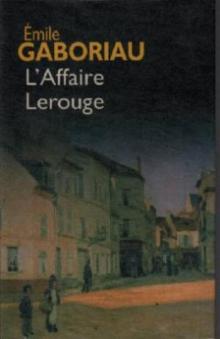 L'affaire Lerouge. English
L'affaire Lerouge. English Le crime d'Orcival. English
Le crime d'Orcival. English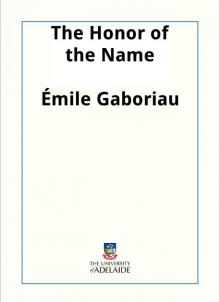 The Honor of the Name
The Honor of the Name The Count's Millions
The Count's Millions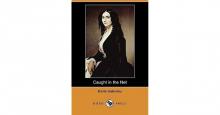 Caught in the Net
Caught in the Net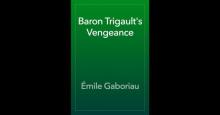 Baron Trigault's Vengeance
Baron Trigault's Vengeance La clique dorée. English
La clique dorée. English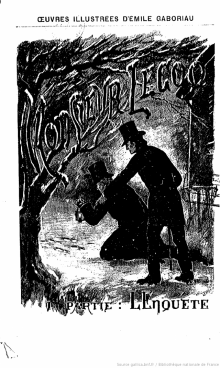 Monsieur Lecoq, v. 1
Monsieur Lecoq, v. 1 Within an Inch of His Life
Within an Inch of His Life Other People's Money
Other People's Money A Thousand Francs Reward; and, Military Sketches
A Thousand Francs Reward; and, Military Sketches